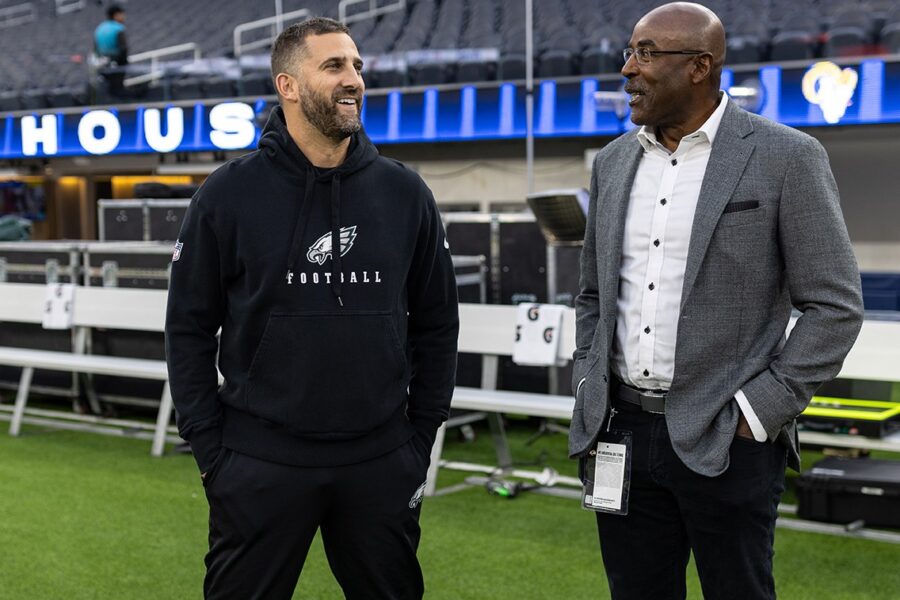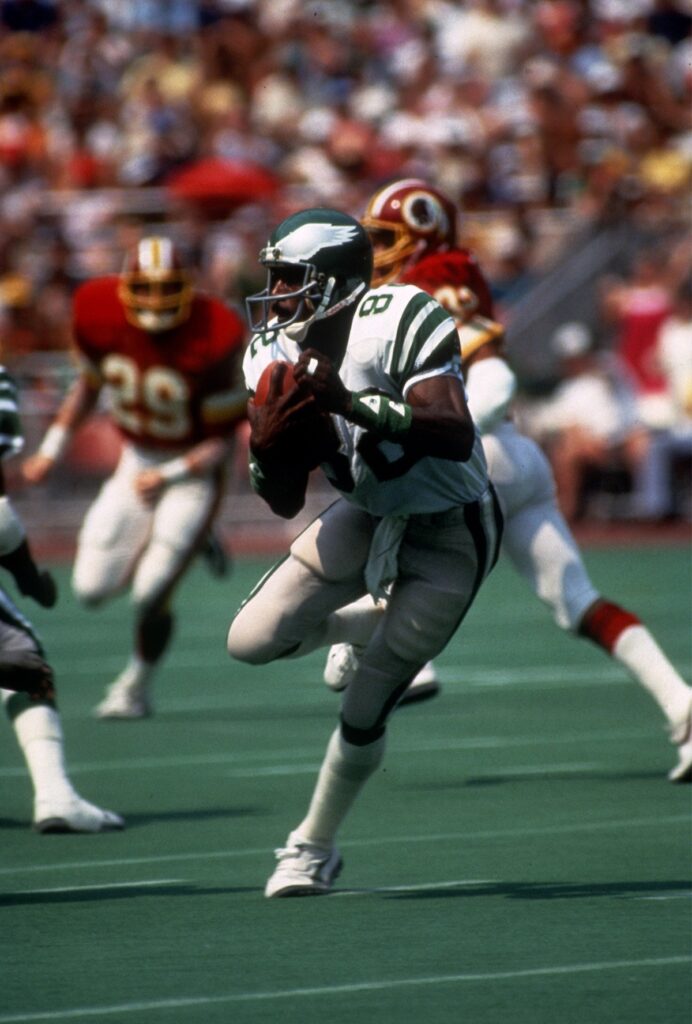
Quick Thinking
Mike Quick thinks about what kind of money today’s top NFL wide receivers make and laughs. “Listen, during my era I made what everyone considered was a lot of money, so I’m happy for these guys and the money they’re making,” Quick said. “When you put your body on the line and do what they ask you to do, you deserve what you get.”
Then he quickly adds.
“If I was making the money these kids make now, I wouldn’t even be talking to you,” he said, laughing. “I would be somewhere on an island just chilling and have someone fanning me.”
Quick, one of the greatest receivers in Philadelphia Eagles history, does talk to you every Sunday, or Monday night, or Thursday night, or whenever the Eagles play. And he has been for 28 years now.
When Stan Walters moved to England after the 1997 season, Quick was hired as the Eagles radio color analyst, and he’s sat in the booth next to Hall of Fame play-by-play man Merrill Reese ever since.
“It’s the way things have worked in my life,” Quick said. “It’s how God has worked in my life. I’ve been given opportunities to do things that I didn’t expect, and they worked out. It’s never been my plan. It wasn’t my plan to do radio for 28 years. It wasn’t my plan to have a nine-year NFL career. I’ve been afforded these opportunities, and when they came, I jumped in and tried to make the most of them. I didn’t want to be a guy who gets an opportunity and screws it up.”
You probably know the story of how Quick became an Eagle in the 1982 NFL draft. Then head coach Dick Vermeil wanted Perry Tuttle, a receiver out of Clemson, in the first round. Vermeil liked Tuttle so much that he told too many people, including Buffalo head coach Chuck Knox. The Bills traded up ahead of the Eagles and took Tuttle, leaving Quick, out of ACC foe North Carolina State, for the Eagles.
Quick played nine years, all for the Eagles. While his numbers speak for themselves, there’s more to his story. After sitting out most of his rookie season, Quick became one of the league’s best receivers from 1983-86. And the Eagles went 5-11, 6-9-1, 7-9, and 5-10-1. So, while Quick was great, the Eagles were bad. Then, when the Eagles got good, Quick’s knees gave out from whatever that surface was that the team played on at Veterans Stadium.
There’s also the fact that Quick’s quarterbacks were an aging Ron Jaworski when he started and an inexperienced Randall Cunningham when he finished. Still, in those four years from 1983-86 he caught 262 passes for 4,647 yards and 42 touchdowns. Even in the strike-shortened 1987 season, he caught 46 passes for 790 yards and 11 touchdowns in just 12 games.
And that was before the NFL turned into the pass-first game it is today.
“When I played the game in the ‘80s, first down you ran the ball, second down you ran the ball, third down you passed the ball,” Quick said. “Today, you start the game with three wide receivers on the field, and 65 percent of the time, you have three wide receivers on the field. It’s a passing game. It’s fast break football now as opposed to what it was then.
“I wish it was more open when I played. Some teams did it, Houston had what Buddy Ryan called ‘The Chuck and Duck offense.’ San Francisco, with Bill Walsh, had the West Coast Offense and threw the ball more. But for the most part, you ran first.”
 Quick’s last season was 1990, the Eagles’ third straight playoff year. But his knees allowed him to play just four games that season and a total of just 18 in the three playoff years.
Quick’s last season was 1990, the Eagles’ third straight playoff year. But his knees allowed him to play just four games that season and a total of just 18 in the three playoff years.
And when he walked, or limped, away, he was gone, just as he was when he took a Jaworski pass and went 99 yards for a touchdown in an overtime win over Atlanta in 1985.
“I completely got away from football,” he said. “I needed a break. I knew the transition would be difficult. I needed a real good period to purge and take a break from football. I didn’t even watch the game. I remember I was down in Hilton Head, South Carolina playing golf. We made the turn and stopped in the clubhouse to get refreshments, probably a beer. The Eagles were playing Green Bay. And Randall had just gone down with that knee injury after that hit from Bryce Paup. I wasn’t even paying attention and just happened to stop in the clubhouse, and that game was on TV.
“I went into business, and that got me away from the game. I wanted to see what it was like living life without the game being a part of my life. It was fun. It was great. The business wasn’t the success I hoped it would be. But then at the same time the game started pulling me back in.”
When Comcast SportsNet debuted in the ‘90s, they needed programming and reached out to the Pro Bowl wide receiver. They started a show called Mondays with Mike where Quick would break down the previous Sunday’s game.
“It was pretty easy,” Quick said. “I just went in and accessed the game. I did have to watch the games, now.”
A few years later WIP, the Eagles radio station then, needed a color analyst. Vai Sikahema, who was doing television for NBC-10, and Garry Cobb, who was doing radio for WIP and TV for CBS-3, were in the mix for the spot. Then another name emerged.
“Interestingly enough, the call came from Merrill and he said to me, ‘Stan moved to England and WIP is looking for an analyst to work with me, would you be interested?’” Quick said. “I didn’t know anything about it. I didn’t know Stan left. I didn’t know all these people were sending in tapes and getting in line for the position. I said to Merrill, ‘Why are you calling me?’ He said, ‘I think you would be good at it.’
“Merrill said WIP was going to call me. They did. And I said I would be interested. And didn’t have a clue as to what I was getting into.”
Quick’s first year in the booth was Ray Rhodes’ last year as head coach. The Eagles lost a team record 13 games that year, and according to self-analysis, the new guy on the radio was as bad as the team.
“My first year I knew I was terrible,” Quick said. “After the season, I went to NFL films and got the tapes. I rode around all offseason and listed to Joe Theismann and other NFL analysts and how they approached the game. Then I started to put together charts each week with every player on it, the coaching staff on it and notes about everybody. Once I started to format my work, it made it easier to recall the information I had put on the charts and had gone over every week. Then I started to grow. And 28 years later, I’m still doing what I never thought I would be doing.”
And loving it.
“I like being around the game. I like getting close to the players and the coaches. I really like Nick Sirianni. I like being involved with the best organization in sports.”
“It’s funny if you talk to my college friends, or my family, I was never a talker. I was always a quiet guy. Now I’m making a living talking.”

